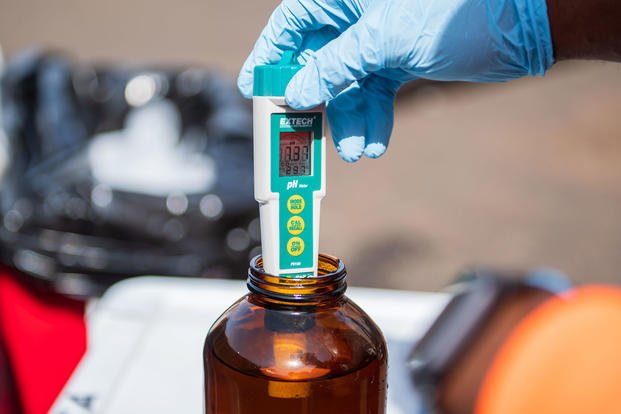The Navy plans to open a medical clinic for people in the Pearl Harbor community who are suffering health problems they believe are connected to the Red Hill fuel spill that leaked 20,000 gallons of fuel into the local water supply last year.
The plan was announced late Monday by the Defense Health Agency without additional details during an update briefing to the media from Hawaii. Dr. Jennifer Espiritu, an interim public health emergency officer for the agency, said residents have reported neurological, respiratory and gastrointestinal problems. The clinic is intended to help treat those issues.
Military families filed a lawsuit in August over exposure and sickness after two separate spills at the Navy's Red Hill Bulk Fuel Storage Facility in 2021, and surveys of residents found that they believe they are still suffering long-term health effects from drinking fuel. But the military has been hesitant to confirm a link between the Red Hill leak and sickness.
Read Next: Former Bonhomme Richard Captain Docked $5,000 in Pay in the Most Severe Punishment Over the Blaze
"People are absolutely having health care problems, that I believe, and people deserve to be seen, that I believe with all my heart. Whether the two are connected, we can't make that leap now," Espiritu told Military.com during the briefing. "But what we want to happen is for people to come in so we can see them, find out what's happening to them, and work them out thoroughly. So if there is a connection, we can pursue it."
A year ago, hundreds of military families reported fuel odors in their tap water; about 93,000 users of the Navy water system were affected by the leaked fuel, which included JP-5 jet fuel, according to the Environmental Protection Agency.
A May survey by the state of Hawaii and the Centers for Disease Control and Prevention found widespread health effects from the spill, which was the result of a leak earlier that year that wasn't discovered and another incident in November 2021 in which a worker rammed a pipe and it burst.
"Eighty-seven percent of over 2,000 survey participants reported at least one new or worsening health symptom following exposure to JP-5 jet fuel in the Navy water system," the state's health department and the CDC said in May. "Thirty-seven percent sought medical care and 17 people reported being hospitalized overnight."
But the military claims there is little research showing a link between fuel exposure and long-term health problems. Espiritu said the existing medical literature points to short-term effects from fuel-tainted drinking water.
"There's a limited number of studies on long-term exposure and definitely not long-term exposure in vulnerable populations like pregnant women, chronically sick people and children," Espiritu said. "So, what was stated back in March, that we didn't expect long-term effects, is true."
Still, the DHA is planning to open the health clinic at Pearl Harbor to see patients reporting just that. The clinic will be modeled on other military treatment facilities and will be staffed with health care workers from the Navy, Army and Air Force to treat military members and families from each service.
"What it is, is a dedicated clinic for people who are exposed to contaminated water where they can come in and have access to their own care teams, as well as specialists to work out their long-term health concerns," Espiritu said.
The opening date, location and hours for the clinic were not released to the public Monday as the planning was still being hashed out. Espiritu said there are ongoing considerations for a long-term health monitoring program for the community, but nothing has been decided.
The military has closed Red Hill, and a task force is working to remove the fuel from the aging facility. Earlier this month, it had completed removal of all residual fuel in the pipes and is now planning to empty the storage tanks.
The incident last year caused widespread fear and anxiety, forcing families out of their homes during the holiday season. At the time, the commanding officer of Joint Base Pearl Harbor-Hickam, Capt. Erik Spitzer, first told families that the water was safe to drink.
"There are no immediate indications that the water is not safe," and "my staff and I are drinking the water on base this morning, and many of my team live in housing and drink and use the water as well," Spitzer said in a message to the community on Nov. 29, 2021.
Spitzer later said he was "deeply remorseful" for the message and retired over the summer with the Legion of Merit award, the second highest non-combat service award.
"This last year has been extremely difficult for our military families and the people of Hawaii. I acknowledge their anger, frustration, disappointment and distrust. I hear them loud and clear," Rear Adm. Stephen Barnett, the commander of Navy Region Hawaii, said during the press briefing Monday.
Barnett said he wants to complete the fuel removal ahead of the planned completion date of June 2024.
Military families sued in August, alleging that the Navy was negligent in preventing a public health crisis and that it "harbored toxic secrets." The lawsuit compares the spill to the water contamination at the Marine Corps' Camp Lejeune in North Carolina, where pollution between the 1950s and 1980s has been linked to cancer and other serious health problems.
-- Travis Tritten can be reached at travis.tritten@military.com. Follow him on Twitter @Travis_Tritten.
Related: Local Hawaii Officials Worried Navy Might Try to Use Red Hill for Fueling Again











